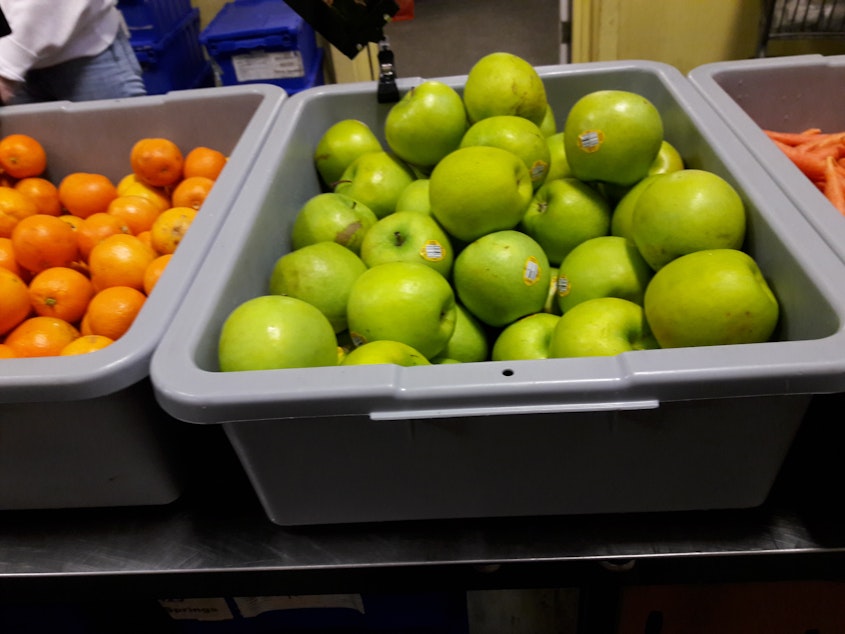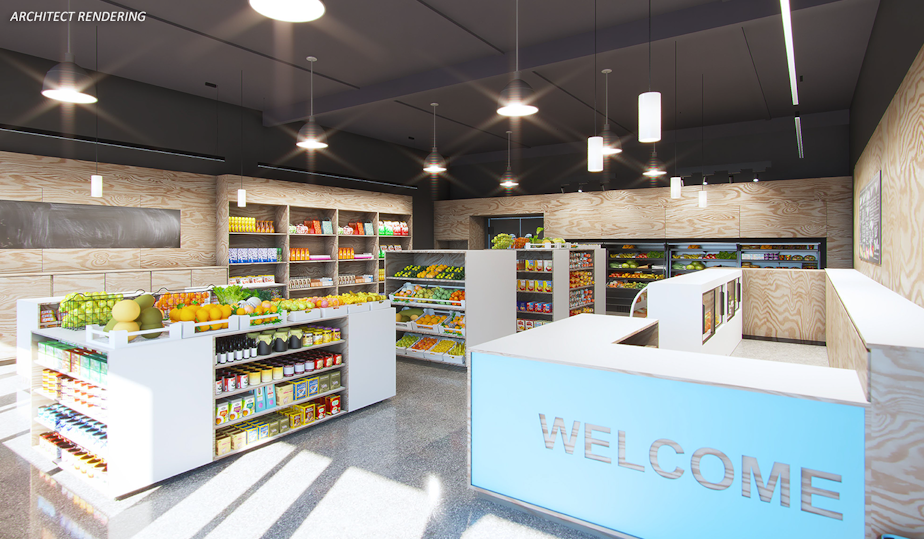As Seattle grows, food banks shift strategies — and locations
Finding a new home for a business is tough in this booming real estate market. But when you’re a non-profit, it’s even more challenging. Two local food banks are relocating, but that could mean some improvements for the people who use them.
Cynthia McGaffic has been coming to the Cherry Street Food Bank in downtown Seattle for four years. On a recent morning, she was there with her toddler, pacifying him with a snack.
McGaffic has had many ups and downs in her life: losing her job, becoming homeless, struggling with substance abuse and mental health issues. She's been sober for four years now and credits the food bank for helping her get back on her feet.
“I come here and I feel safe,” said McGaffic. “This is like my family.”

Sponsored
Cherry Street Food Bank has been housed in a church basement between 7th and 8th Avenue for more than three decades. But last year, the church gave notice that the space was sold and soon to be redeveloped. The food bank had to move.
Cherry Street Food Bank wanted to relocate close enough so current clients could continue to come. The new location had to have good access to buses and public transit. Eventually, the food bank found a new home less than a mile and a half away in the SODO neighborhood.
Thomas Reynolds is CEO of Northwest Harvest, which operates the food bank. Turns out, being forced to move was a good thing, he said.
The current location sits on top of a steep hill, which is difficult for people in wheelchairs in the rain and snow. At the new location, there will be no hills to navigate. Even more exciting, Reynolds said, is that the new space will allow the food bank to offer more than just food to their clients.
Reynolds says the new location will look like a regular store, but will also have classes on how to make nutritious meals using a hot plate and consultations on immigration issues. The new space will also have a new name: SODO Community Market.
Sponsored

The average Seattle food bank distributes nearly a million pounds of food throughout the year. But food banks are no longer just a resource for food. They’ve become a convenient place to provide other services that people might need.
At the Ballard Food Bank, a healthcare provider, a social worker, or some other community provider comes in every week. Executive director Jen Muzia says having regular services is more convenient, especially for the food bank's homeless clients.
“We talk to them and get to know them," Muzia said. "And then they talk to staff and we start to hear what they need.”
Sponsored
Like Cherry Street, Ballard Food Bank is moving. Muzia says the food bank has outgrown its space. The lease expires in 2021 and it was time to find a place big enough for the services the food bank offers.
For clients who are not homeless, but on the verge, the Ballard Food Bank offers rent utility assistance, help with understanding clients' rights as tenants and much more.
“It’s really about homelessness prevention," Muzia said. "And so it’s really like: How do we help people stay and keep them in their homes, keep them warm, so they stay stable?”
But a large number of people who visit Seattle food banks aren't unemployed.
Recently, Reynolds heard from a client who said he was going to miss the Cherry Street locations because it was close to his work.
Sponsored
"There are many people working two, three jobs with no benefits, fairly low-cost, in a very high-cost city," Reynolds said.
Lovella Black Bear has been coming to the Cherry Street Food Bank since 1989. The food bank was a lifeline when she was a single parent trying to make ends meet. She’s now retired, but still comes in because of the fresh produce it offers.
“Today they’re having oranges, fresh pears and bundles of bananas,” said Black Bear. “Coming to this food bank, my health was poor. Today, I no longer am a diabetic.”
Black Bear plans on coming to the new location, too. She’s been telling her friends about Northwest Harvest’s new spot and the programs the food bank will offer.




